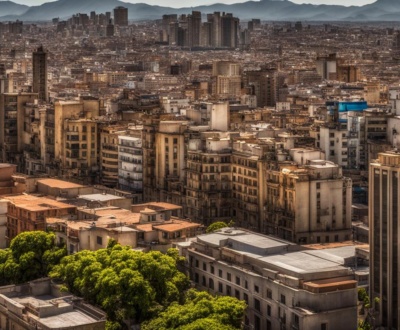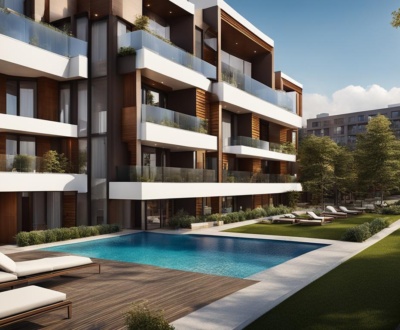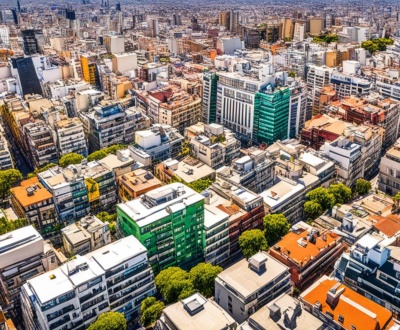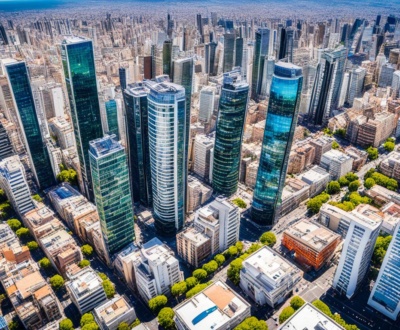Welcome to your comprehensive guide to buying real estate in Argentina. Whether you’re considering a land purchase, looking for information on real estate loans, or simply interested in the property market in Argentina, you’ve come to the right place. We’ll provide you with all the details and insights you need to navigate the process of buying property in this beautiful country.
Argentina is a popular destination for foreigners looking to invest in real estate, thanks to its rich culture, stunning landscapes, and potential for growth. From the bustling streets of Buenos Aires to the tranquil countryside, there’s a wide range of opportunities for property investment.
Whether you’re dreaming of a secluded rural retreat or a vibrant city apartment, understanding the ins and outs of the real estate market and the availability of real estate loans will be crucial to making informed decisions. We’ll guide you through the process, highlighting the opportunities, risks, and considerations along the way.
So, if you’re ready to embark on your real estate journey in Argentina, let’s dive in and discover everything you need to know about buying property and securing real estate loans. Land purchase in Argentina awaits you!
Can foreigners buy property in Argentina?
Yes, foreigners can buy and own property in Argentina. According to the Argentine Constitution, foreigners have the same civil rights as Argentine citizens, including the right to own real estate. However, there are certain restrictions on the acquisition of land by foreigners, as established by Ley N° 26737. Foreigners also need a CDI (Tax ID) and must prove that their property purchase will benefit the local community.
Buying land as a foreigner in Argentina
Foreigners interested in investing in Argentine property have the opportunity to purchase rural land in Argentina. However, there are certain rules and regulations that need to be taken into account. Ley 26.737 outlines these guidelines, which include the following restrictions:
- Foreigners cannot buy land with important water sources or land near important water sources.
- Restrictions are placed on the amount of land foreigners can own in each province.
- There are limitations on land ownership for foreign companies.
It’s important to be aware of these restrictions before making any land purchase in Argentina. These measures aim to protect the country’s natural resources and ensure the fair distribution of land ownership.
However, there are exceptions for individuals who have lived in Argentina for a certain period of time or have Argentine children. These exceptions provide an opportunity for those with strong ties to the country to invest in land and contribute to the local community.
Investing in Argentine property offers a unique opportunity for expats looking to establish a presence in Argentina. By understanding the regulations and restrictions surrounding land purchase in Argentina, foreigners can navigate the property market in Argentina with confidence.
| Key Takeaways |
|---|
| Foreigners can purchase rural land in Argentina, but there are restrictions on important water sources, land near important water sources, and land ownership for foreign companies. |
| Exceptions exist for individuals who have lived in Argentina for a certain period of time or have Argentine children. |
| Understanding these regulations is crucial for a successful land purchase in Argentina. |
Can owning property in Argentina grant residency?
Owning property in Argentina does not automatically grant residency. However, foreigners can apply for temporary residency as investors if they make a significant investment in Argentina and meet certain criteria. This temporary residency can be renewed for up to three years.
While owning property in Argentina alone does not guarantee residency, it can be a contributing factor in the application process. Foreigners who wish to relocate to Argentina and obtain residency will need to meet specific requirements beyond property ownership.
Applying for residency as an investor typically requires making a significant investment in the country, which can include purchasing property, starting a business, or investing in local industries. The investment must be approved by the relevant authorities, and applicants must demonstrate that their investment will benefit Argentina’s economy and community.
“Owning property in Argentina opens up opportunities for foreign investors to potentially qualify for temporary residency. It is important to navigate the application process and meet the necessary criteria, including demonstrating a significant investment and its potential positive impact on Argentina.”
Temporary residency as an investor allows expats to live and work in Argentina legally for the duration of their residency permit. It also provides certain rights and benefits, including access to healthcare and education facilities.
It’s essential to note that residency requirements and regulations may vary over time, so it’s always advisable to consult with immigration experts or legal professionals who specialize in Argentina’s immigration and residency processes.
Overall, while owning property in Argentina does not automatically grant residency, it can be a stepping stone towards obtaining temporary residency as an investor. Expats interested in relocating to Argentina should thoroughly research and understand the specific requirements and procedures involved in the residency application process.
Should you buy or rent in Argentina?
The decision to buy or rent property in Argentina depends on individual circumstances. If you plan to use the property for at least three months a year or potentially retire and live in Argentina, buying may be a wise choice. However, if you’ll use the property less frequently, renting may be more suitable.
There are several factors to consider when deciding whether to buy or rent in Argentina:
- Economic factors: The state of the Buenos Aires property market and Argentina’s overall economy can influence the decision. It’s important to evaluate the stability and growth potential of the market.
- Financing options: If you’re considering buying, you’ll need to explore financing options and determine if you’re eligible for a real estate loan in Argentina.
- Property investment opportunities: Assess the potential for property appreciation and investment returns in the specific area you’re interested in.
Ultimately, it’s crucial to carefully weigh the financial, personal, and long-term aspects of buying or renting property in Argentina. Consulting with real estate professionals and financial advisors can provide valuable insights to guide your decision.
“Buying property in Argentina not only offers the potential for long-term financial appreciation but also the opportunity for an enriching lifestyle. Renting, on the other hand, provides flexibility and allows you to experience different neighborhoods and areas without committing to a long-term investment. The choice depends on your goals and priorities.”
To get a better understanding of the decision-making process, let’s take a look at a comparative table:
| Buying Property | Renting Property |
|---|---|
| Long-term investment | Flexibility |
| Risk and reward potential | Less financial commitment |
| Opportunity for equity and property appreciation | No property maintenance responsibilities |
| Potential rental income | Ability to explore different neighborhoods |

What are the different steps of the buying process?
Buying property in Argentina involves a series of steps that ensure a smooth and legally binding transaction. Understanding the process is crucial for anyone considering a property purchase in Argentina.
The following are the key steps involved in buying property:
- Find a Notary Public (‘escribano’):
- Obtain a tax ID (Clave de Identificación):
- Find a real estate agent:
- Make an initial offer (‘reserva’):
- Sign a purchase agreement (‘Seña’ and/or ‘Boleto’):
- Finalize the title deed transfer (‘escritura’) and payment:
A Notary Public is a legal professional who oversees real estate transactions in Argentina. They play a crucial role in verifying the legality and validity of the property documents. It is essential to engage a reputable and experienced Notary Public to guide you through the process.
As a buyer, you will need to obtain a tax identification number called Clave de Identificación (CDI). This ID is necessary for various legal and financial transactions throughout the property purchase process.
Working with a reliable and knowledgeable real estate agent can greatly simplify the property search and selection process. They can provide valuable insights into the local market, suggest suitable properties, and negotiate on your behalf.
Once you’ve found a property you’re interested in, you can make an initial offer (‘reserva’) to the seller. This offer is usually accompanied by a deposit to secure the property. If the offer is accepted, it marks the first step towards finalizing the purchase.
After the initial offer is accepted, you will need to sign a purchase agreement (‘Seña’ and/or ‘Boleto’). This agreement outlines the terms and conditions of the purchase, including the purchase price, payment terms, and the deadline for the final payment and deed transfer.
The final step in the buying process is the title deed transfer (‘escritura’) and payment. This step involves the formal transfer of ownership from the seller to the buyer. It is done in the presence of a Notary Public and requires both parties to sign the deed. At this stage, the remaining payment is usually made in full.
Each step in the property buying process has its own duration and cost implications. It’s essential to consult with professionals and experts who can guide you through each stage and provide the necessary advice.
Expert Tip:
“Before initiating the property purchase process in Argentina, it’s recommended to research and understand the local property market. Engage with industry experts who can provide up-to-date insights, advice, and guidance based on their extensive knowledge and experience.”
| Step | Description |
|---|---|
| Find a Notary Public (‘escribano’) | A legal professional who oversees real estate transactions and ensures their legality and validity. |
| Obtain a tax ID (Clave de Identificación) | A tax identification number necessary for legal and financial transactions during the property purchase process. |
| Find a real estate agent | A knowledgeable professional who assists in property search, negotiation, and market insights. |
| Make an initial offer (‘reserva’) | An offer accompanied by a deposit to secure the property and initiate the purchasing process. |
| Sign a purchase agreement (‘Seña’ and/or ‘Boleto’) | A legally binding agreement that outlines the terms and conditions of the property purchase. |
| Finalize the title deed transfer (‘escritura’) and payment | The formal transfer of ownership, completed in the presence of a Notary Public, and full payment is made. |
How is the real estate market in Argentina?
The property market in Argentina, particularly in Buenos Aires, has witnessed a decline in prices over the past few years. This can be attributed to various economic factors and inflationary pressures. Additionally, the availability of financing options also has an impact on the market dynamics.
When considering investing in real estate in Argentina, it is crucial to carefully analyze market indicators and consult with real estate experts. They can provide valuable insights and guidance to help you make informed investment decisions.
“The Argentine property market has experienced a significant adjustment in recent years, particularly in major cities like Buenos Aires. The combination of inflation, economic factors, and financing challenges has influenced property prices. As a result, there may be attractive investment opportunities for savvy investors.”
– Real Estate Expert
Factors influencing the property market in Argentina
Several factors contribute to the fluctuations in the property market in Argentina:
- Economic conditions: The overall economic stability and growth of the country greatly influence property prices.
- Inflation: High inflation rates impact the purchasing power and affordability of potential buyers.
- Financing options: The availability and conditions of real estate loans affect the demand for properties.
Understanding these factors and their impact on the market is essential for making successful real estate investments in Argentina.
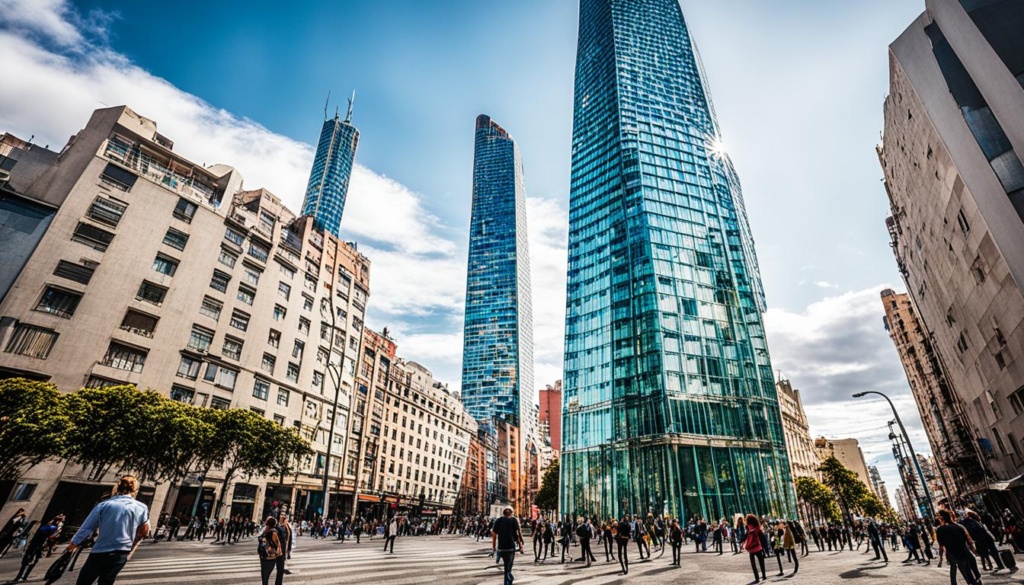
| Advantages | Disadvantages |
|---|---|
|
|
Real Estate Loans in Argentina
The availability of real estate loans in Argentina can be limited. However, there are options like Banco Ciudad, which has created various lines of credit specifically designed to help potential buyers finance their property purchases. These loans provide a valuable opportunity for foreigners and locals alike to invest in the thriving property market in Argentina.
When considering real estate loans in Argentina, it’s essential to understand the criteria set by banks and financial institutions. Typically, applicants are required to provide proof of income and meet a minimum investment requirement. This ensures that borrowers have the means to repay the loan and are committed to the property purchase.
Exploring different financing options is crucial to finding the right loan that suits your needs. It’s beneficial to consult with financial experts who have extensive knowledge of the property market in Argentina and can guide you through the loan application process.
By taking advantage of real estate loans, you can transform your property ownership dreams into a reality, whether it’s investing in residential properties or commercial real estate. These loans help bridge the financial gap, providing the necessary funds to purchase your desired property in Argentina.
Risks and Considerations for Buying Property in Argentina
Buying property in Argentina can be an enticing investment opportunity, but it’s important to be aware of the potential risks and considerations. Before making a purchase, it’s essential to thoroughly evaluate the property market in Argentina, the economic stability of the country, and the specific factors that may affect your investment.
Location of the Property
The location of the property plays a crucial role in its value and potential for growth. Research the neighborhood, accessibility to amenities, and proximity to transportation hubs. Consider factors such as crime rates, urban development plans, and the overall desirability of the area.
Property Taxes and Government Taxes
When buying property in Argentina, it’s vital to understand the property tax obligations. Research the local tax laws and regulations to ensure you factor in these expenses. Additionally, be aware of any potential government taxes that may be applicable to property ownership, such as capital gains taxes or transfer taxes.
Market Conditions
The property market in Argentina can be influenced by various factors, including economic stability, inflation rates, and demand for real estate. Stay informed about the current market conditions, trends, and forecasts to make informed decisions about your investment.
Consulting with Real Estate Agents
Partnering with experienced real estate agents who specialize in the Argentine property market can provide valuable insights and guidance. They can help you navigate the local landscape, identify potential risks, and find properties that align with your investment goals.
“Consulting with real estate agents and understanding the local landscape can help mitigate risks.”
Investing in property carries inherent risks, but by conducting thorough research, seeking expert advice, and carefully considering all relevant factors, you can minimize those risks. Take the time to evaluate each aspect of the property purchase process and make informed decisions that align with your investment objectives.
Factors to Consider when Buying Property in Argentina
| Consideration | Description |
|---|---|
| Location | Research the neighborhood, accessibility, and desirability of the area. |
| Property Taxes | Understand the property tax obligations and local tax laws. |
| Government Taxes | Be aware of potential government taxes related to property ownership. |
| Market Conditions | Stay informed about economic stability, inflation rates, and demand for real estate. |
| Consulting with Real Estate Agents | Seek guidance from experienced agents familiar with the Argentine property market. |
Conclusion
Investing in real estate in Argentina can offer lucrative opportunities for foreign buyers. However, navigating the property market in Argentina and conducting a successful land purchase requires careful consideration and informed decision-making.
Understanding the laws and regulations surrounding real estate ownership, particularly for foreigners, is crucial. It’s recommended to consult with local experts who have a deep knowledge of the property market in Argentina and can guide you through the process.
Additionally, thorough research and analysis of the current property market conditions are essential. Keep track of market trends, economic indicators, and inflation rates to make well-informed investment decisions.
By taking these steps and approaching your land purchase in Argentina with diligence, you can enhance your chances of a successful and profitable investment in the vibrant and diverse real estate market of Argentina.
More from our blog
See all postsRecent Posts
- Argentina Property Management: Expert Care & Services February 2, 2024
- Understanding Argentina Real Estate Law Essentials February 2, 2024
- Argentina Luxury Apartments: Upscale Living February 1, 2024



